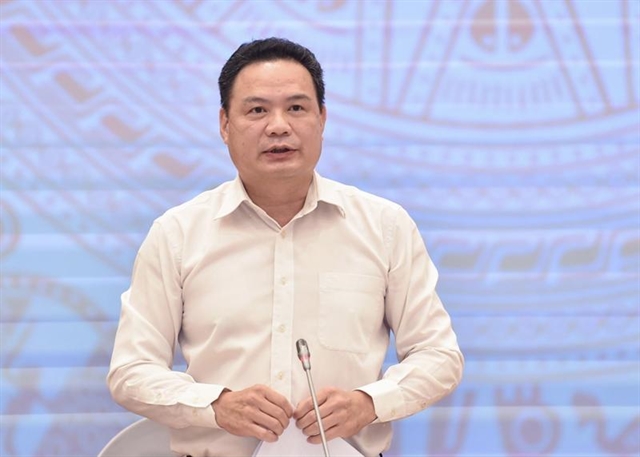 Society
Society
.jpg)
 |
| Deputy Minister of Labour, Invalids and Social Affairs Lê Văn Thanh. — Photo baochinhphu.vn |
The nationwide fund for replacing ramshackle and short term housing for low-income and near-poor households is expected to provide a vital boost, offering millions of citizens additional funding to address substandard housing, supplementing resources beyond the State budget. Deputy Minister of Labour, Invalids and Social Affairs Lê Văn Thanh, in a recent interview with the Vietnam News Agency, said that assessments reveal that over three hundred and fifteen thousand low-income households across Việt Nam still need support to build or repair their homes.
In recent years, how effective have housing support policies been for those with contributions to the revolution and low-income households?
In recent years, the Party and State have prioritised improving the lives of national contributors and low-income households, particularly through housing support.
Since 2008, several programmes have provided crucial assistance. Programme 167 supported low-income families, Programme 133 aimed at poverty reduction, Programme 48 focused on housing improvements for flood and typhoon-affected areas in central Việt Nam and Programme 22 targeted housing for revolution contributors. These initiatives have facilitated the construction or repair of homes for 820,000 families nationwide, funded by State budgets and social resources.
The Vietnamese Fatherland Front has supported the building of houses for 670,000 struggling households.
Local authorities are vigorously implementing housing assistance for low-income and near-poor households in disadvantaged districts through the sustainable poverty reduction national target programme and the national target programme for socio-economic development in ethnic minority and mountainous areas. These programmes aim to build or repair homes for over 100,000 families, with support already reaching more than 66,000 households.
These housing support programmes have a profound humanistic impact, promising better lives for those now able to live in stable housing, pursue productive work and find new motivation to improve their lives.
The movement to eliminate temporary and substandard housing has grown into a nationwide campaign, mobilising resources from central and local governments and actively involving ministries, sectors and organisations such as the police, military, businesses and the broader community.
Importantly, low-income and near-poor households have also demonstrated a strong commitment to improving their living conditions.
The goal is to fully eradicate temporary and substandard housing across the country by the end of 2025.
With the recent launch of the Government and Central Committee of the Vietnamese Fatherland Front’s programme to eliminate temporary and substandard housing, what key issues should local authorities consider during implementation?
Recent assessments reveal that over three hundred and fifteen thousand low-income households across Việt Nam still need support to build or repair their homes. The newly established national fund to eliminate temporary and substandard housing for low-income and near-poor households aims to meet this need, drawing on donations from organisations and individuals to provide vital funding beyond the State budget.
To implement this programme effectively, localities must treat this as a priority political task.
As per the Prime Minister's directive, efforts should be diversified to encourage all forms of contribution, based on the principle 'everyone gives what they can'.
 |
| A newly built home for a family in Yên Sơn District, Tuyên Quang Province, part of the project to replace temporary and dilapidated housing for poor households. — VNA/VNS Photo Quang Cường |
Public awareness of the Party’s and Government’s goals should be strengthened to mobilise community resources alongside State funds. Such combined efforts are crucial to helping low-income families secure stable housing.
Local authorities should also promote self-reliance, encouraging low-income households to take an active role in building or repairing their homes.
Localities must carefully identify households eligible for support, ensuring the process is transparent and compliant with regulations to prevent waste, fraud, or corruption.
Homes constructed through this programme must be durable, provide essential functional spaces and have a minimum lifespan of 20 years.
What solutions and approaches will the Central Steering Committee adopt to achieve the goal of eliminating temporary and substandard housing for low-income and near-poor households by the end of 2025?
On October 22, Prime Minister Phạm Minh Chính signed Decision No. 1243/QĐ-TTg to form the Central Steering Committee tasked with eliminating temporary and substandard housing nationwide by December 31, 2025.
The committee's goal is to propose and implement effective solutions across three housing programmes, including support for national contributors, housing via national target programmes and eliminating inadequate homes for the general public.
The Ministry of Labour, Invalids, and Social Affairs (MOLISA) will coordinate with local authorities and other sectors to identify and support eligible households.
The programme aims to provide safe, resilient housing for low-income and near-poor households, adaptable to regional disasters and improve the quality of life by removing substandard housing.
MOLISA has proposed strategies to allocate resources, estimate funding needs, and coordinate with various sectors to mobilise support.
The nationwide campaign is expected to finish five years ahead of schedule and coincide with several significant anniversaries. — VNS
.jpg)



